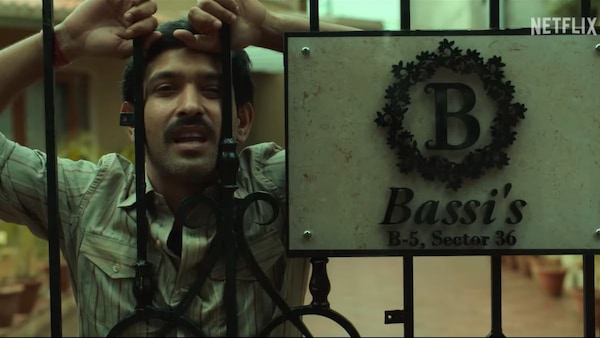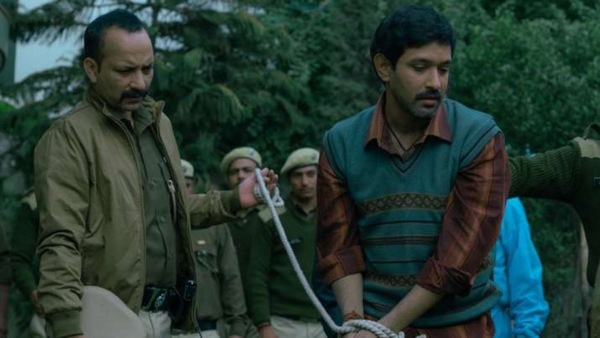Sector 36 Is A Compelling Social Thriller About The Bias Of Justice
Based on the high-profile Nithari killings, Sector 36 is less about identifying the perpetrators and more about an investigation into what led — and leads — to the perpetuation of such crimes.

Promo poster for Sector 36.
Last Updated: 01.21 PM, Sep 14, 2024
SOME ACTORS have the gift of presence. Our attention gravitates towards them the moment they enter the frame. And then it stays, as if their existence has a bigger purpose than what is unfolding centrestage. Examples are plenty and singling them out feels redundant given how committed Hindi films are in slanting one’s vision towards a person rather than the plot. But Vikrant Massey is an exception to this. The actor has a curious ability to negotiate with our gaze, where he holds it hostage when he wants to and relinquishes it when he so desires. One can count this as versatility (in the last five years, he has played an unhinged lover, a disingenuous man leading a double life, and a righteous aspirant with unyielding tenacity). But it is bigger than merit. It is cultivated but also fortuitous — like a gift. Massey has, what one can term, the gift of absence.
He can blend in the background and bleed at the foreground with a shapeshifting flair; he can exert and wound up himself with fuss-free agility. Nowhere is this more evident than in Aditya Nimbalkar’s Sector 36, a grisly thriller loosely modelled on the 2006 Nithari Killings, where a Noida-based businessman, Moninder Singh Pandher and his help, Surinder Koli were accused of killing and dismembering 19 young women and children. Massey plays the domestic help Prem, who abducts, rapes and buries children. It is a transformative performance that is prone to excess but unravels as a tutorial on craft.
The actor is present in only a handful of scenes yet his physicality distills the depravity in the air, exploding in a major scene where Prem admits to raping and killing the children, and later trafficking their organs. Everything about the moment is petrifying — the suddenness of the confession, the stunned police officers listening to Prem — but none more than Massey who offers himself up to the portrayal with chilling generosity and attunes his eyes to light up to perversion. It is a transcendental turn, ably matched by Nimbalkar’s assured directorial debut.

Children are mysteriously disappearing from the slums in Delhi’s Rajiv Gandhi Camp. The parents have filed complaints but the cops are hesitant. The reasoning is simple: the neighbourhood is inhabited by migrants, who is to say they have not run away and will come back later? On the other side of the ghetto is an opulent bungalow of Balbir Bassi (a menacing Akash Khurana), a shifty man unable to keep his hands away even from his granddaughter. Prem is his domestic help.
Sector 36 shares its skeletons with the high-profile Nithari Killings case but unfolds as a compelling social thriller with a mind of its own. The year is changed to 2005, Nithari becomes Shahdara and the names are altered. On a more fundamental level, Nimbalkar’s film is less about identifying the perpetrators and more about an investigation into what led — and leads — to the perpetuation of such crimes. In that sense, it aligns closely with Meghna Gulzar’s Talvar (2015; Nimbalkar was an associate writer on it) where the failure of the system (both Pandher and Koli were acquitted in 2023 due to lack of evidence) is built into the premise and depicted as a systematic failure.

Ram Charan Pandey (a sublime Deepak Dobriyal) is one of the three police officers at the understaffed Shahdara police station. The morally ambiguous inspector listens to the grieving parents, stuffs money in their pockets and does nothing to look out for their children. He is not corrupt as much as he is a conditioned upholder of law, trained to invest in things with a bigger payoff. It is only when Prem nearly kidnaps his daughter on Dussehra that something finally stirs within Pandey. As he runs after a masked man, the dam dividing the slum and the station fades away in his mind and he reckons that he is part of the system and susceptible to it. Not unlike Prem.
Under the garb of a cat and a mouse chase, Sector 36 unravels as a persuasive study of class and the bias of justice. Written by Bodhayan Roychaudhury, the film is dotted with little details that go a long way. It opens with a brilliantly lit scene (Saurabh Goswami of Munjya fame is the cinematographer) which is reminiscent of Parasite in its bare details: Prem is lying down on the sofa, wearing the housecoat of his master and watching a Who Wants to Be a Millionaire-template reality show. The question that booms from the television is about the singer of the patriotic song, 'Sare Jahan Se Achcha'. The contestant has no clue but Prem, an illiterate man from Chamba who wears his employer’s housecoat in the latter’s absence, knows. Midway Nimbalkar brings another subplot where a child from an affluent family gets kidnapped and the cops jump into action, recovering him in no time.

These are light touches with the filmmaker not insisting but laying bare the build-up behind the headlines. In his retelling of a sordid crime, Nimbalkar literalizes the conjectures about organ trafficking and cannibalism and limits the ambiguity, often linked with the case, only to the extent of Bassi’s crimes. The film never really illustrates them and in its resistance hides Sector 36’s commentary: it does not matter. It does not matter what someone like Bassi did as long as there are people like Prem and Pandey to take the bullet for – or from – them.
Sector 36 is currently streaming on Netflix.
